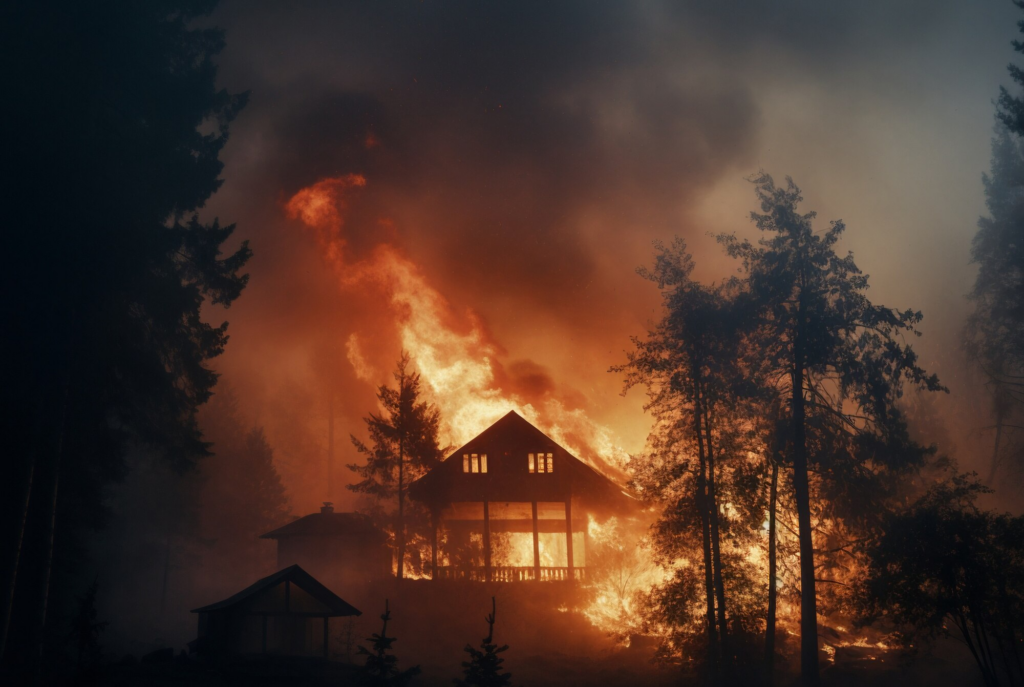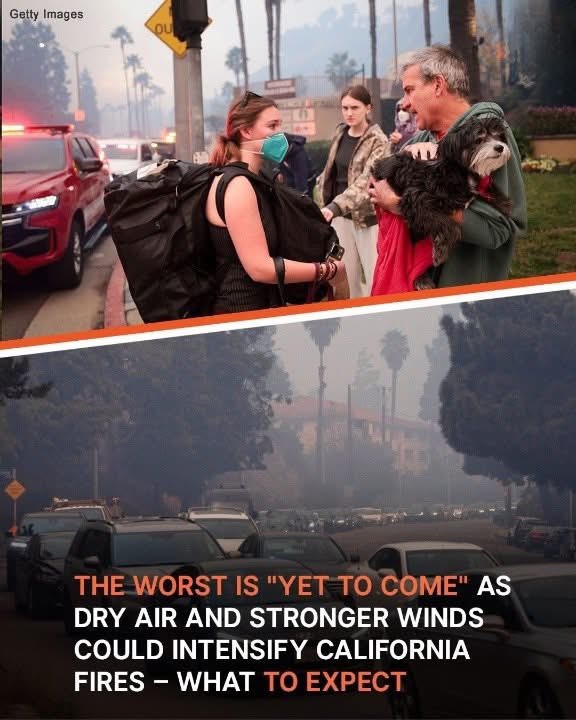Thousands of people are frantically seeking safety after the Palisades Fire in Los Angeles, with elderly individuals being evacuated in nothing more than their socks and pajamas. Regrettably, it seems that this intense conflict is far from being resolved, as powerful winds compelled planes to land and the flames escalated beyond control.
Fierce winds fueled the flames and caused confusion in evacuation zones as the Palisades Fire exploded with such ferocity that inhabitants were forced to evacuate for their lives, some without shoes or basic needs.
More than 30,000 people were forced to evacuate their homes as the initially controllable fire rapidly grew out of control, leading authorities to warn that the worst was “yet to come.”
By early evening, approximately 3,000 acres had been burned by the fire, which started at 10:30 a.m. close to Piedra Morada Drive. As inhabitants frantically fled, it surged at an alarming rate, burning the equivalent of more than one football field every minute and hopping highways due to the unrelenting winds
Firefighting planes were grounded due to the strong winds, which were predicted to reach up to 80 mph. This made it practically impossible to confine the fire. According to Margaret Stewart, a spokesman for the Los Angeles Fire Department, dangerous weather forced the suspension of air support at 8 p.m.

Firefighters were forced to combat the conflagration from the ground up, dealing with erratic flames and intense fire behavior. The scene was uncannily similar to other wildfires in California, especially the Franklin Fire in December, which ravaged the same area.
This time, the evacuation procedure was rendered considerably riskier by traffic congestion. Many locals chose to flee to safety on foot after abandoning their automobiles on clogged highways.
In order to make room for emergency vehicles, firefighters asked individuals to park their cars on the side of the road or to leave their keys behind. However, a lot of cars were left in the road, so in order to make room, workers had to remove cars from the streets
The Palisades region wasn’t the only place where the catastrophe was developing. An elderly care facility in the area had to evacuate its residents due to the Eaton Fire, which threatened Altadena and Pasadena in neighboring Los Angeles County.
About 95 patients, many of whom were in wheelchairs or on gurneys, were evacuated in a hurry by staff at The Terraces at Park Marino assisted living home.
While fire officials scrambled to obtain safer housing, video footage showed elders sitting in a 7-Eleven parking lot, some of them without shoes and wrapped in shawls and thin gowns.
As authorities cautioned that this fire incident was far from done, the situation’s seriousness increased. Daniel Swain, a climate scientist at UCLA, warned that the combination of the dry weather and the strong winds was a formula for disaster.
During an update, Governor Gavin Newsom reiterated these worries. In anticipation that firefighters could have to deal with more fires than just the Palisades and Eaton fires, he said, fire personnel had been placed strategically in high-risk regions.
“We are anticipating — hopefully we’re wrong — but we’re anticipating other fires happening,” Newsom said, acknowledging the state’s vulnerability to wildfire outbreaks during extreme weather events.
To minimize the damage and guarantee citizens’ safety, local officials and fire agencies put in countless hours of work. In order to support firefighting efforts, the city of Santa Monica deployed mutual help in coordination with the Los Angeles Fire Department.
Overnight, winds remained a significant threat, prompting Santa Monica officials to remain vigilant and closely monitor any developments. Steve Madison, the vice mayor of Pasadena, advised locals to stay away from the parking areas of Rose Bowl Stadium.
His office posted an update on social media, writing in part, “Please be advised the Rose Bowl Stadium parking lots will be used tonight and in the coming days as a command post for Pasadena Fire and Police.”
Authorities worry that additional devastation may occur because the Palisades Fire has already caused a great deal of damage and conditions are predicted to get worse.
Until Thursday, Los Angeles and eastern Ventura counties are under a “particularly dangerous situation” warning from the National Weather Service.
An extreme fire hazard was mentioned in the alert because of the strong winds and low humidity, which are ideal conditions for wildfire outbreaks.
According to Swain, the fire danger would be high all week long because of the progressively drier vegetation, even though the greatest winds were predicted to occur Tuesday night into early Wednesday morning.
Swain highlighted how the wind event would have a prolonged impact on vegetation, increasing fire risk as the week progressed. “The vegetation will become progressively drier the longer the wind event goes on,” he explained.
According to his prediction, the wind event’s driest circumstances would come near the finish, making it more likely that more fires will start.
“Some of the strongest winds will be at the beginning of the event, but some of the driest vegetation will actually come at the end, and so the reality is that there’s going to be a very long period of high fire risk,” said Swain.
Firefighters on the front lines were also at risk from the blaze. Often lacking air support, the crews faced a challenging battle.
Rather, they used hoses and hand equipment to try to limit the quickly spreading flames while negotiating the dangerous terrain.
In addition to feeding the fires, the winds made it hard to forecast the trajectory of the flames, requiring firefighters to stay alert and adjust to the fire’s erratic movements.
Actor Steve Guttenberg was one of the people spreading the news about evacuation orders and asking locals to take the fire seriously.
His actions, as well as those of other volunteers, first responders, and community members, demonstrated the value of teamwork in times of disaster.
As the Palisades and Eaton fires continued to burn, residents across Southern California remained on edge, knowing that the worst might still be ahead. “This event is not only not over, but it is just getting started and will get significantly worse before it gets better,” Swain stated.
Although local authorities and fire personnel have put in countless hours to control the fires and safeguard people, the area is prepared for additional difficulties in the days ahead because it is unlikely that the situation will improve anytime soon.

Leave a Reply